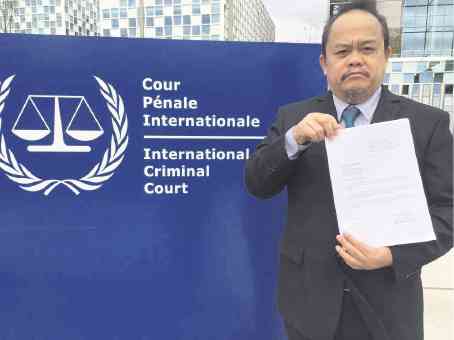
Lawyer Jude Josue Sabio —CONTRIBUTED PHOTO
The lawyer who brought charges against President Rodrigo Duterte in the International Criminal Court (ICC) admitted on Sunday that he felt “tremendous pressure” from the implications—and consequences—of what he may have set in motion.
“I always assume my life is in danger, especially now that my enemy is not only the President,” said Jude Josue Sabio, who lodged the complaint accusing Mr. Duterte of mass murder of suspects and criminals in his brutal war on drugs.
“He (Mr. Duterte) has tentacles everywhere and they are killers,” the University of the Philippines law graduate said in an interview with the Inquirer.
Fight for justice
Addressing critics who question his motives, the 51-year-old Sabio said: “My purpose is not to destroy him (the President), embarrass him, or shame him. My purpose is to fight for justice.”
Besides his personal safety, Sabio said he feared for the lives of his clients, confessed Davao Death Squad (DDS) hit men Edgar Matobato and Arturo Lascañas, both of whom had turned whistleblowers and were now fugitives.
Both men are facing outstanding warrants of arrest and have been in hiding for several months after appearing in a Senate inquiry and detailing the alleged activities of the DDS in Mr. Duterte’s hometown.
“It’s hard for them to surrender. I am sure they will be killed,” he said.
About 4,000 mostly urban poor Filipinos have been killed by police in Mr. Duterte’s signature campaign that has alarmed the international community.
Human rights groups say they believe the death toll is far higher and accuse police of systematic cover-ups and executions.
The Philippine National Police and the Duterte administration have denied the accusations.
Mr. Duterte himself has denied ever giving an order to police officers to kill drug suspects. “I just told them to destroy the apparatus [of the drug trade],” he has said.
ICC examination
The Office of the Prosecutor of the ICC announced last week that it would start looking at the Philippine case, focusing on “alleged crimes committed since at least July 1, 2016, in the context of the ‘war on drugs’ campaign” of Mr. Duterte.
The examination is the first formal step that the ICC prosecutor takes when considering whether a situation in a member state could eventually lead to charges. The process may take years.
But Sabio said he was optimistic that the ICC prosecutor would complete its initial probe within the year, so a formal investigation could be launched.
“I may be wrong in my forecast, but I don’t think this will exceed one year. Even this year, the formal investigation can begin,” he said.
Though he conceded that some of the ICC’s pending cases at a similar stage had taken years to complete, Sabio said: “I am confident that based on my communication and based on the communication of Sen. [Antonio] Trillanes and [Magdalo Rep. Gary] Alejano, we will be able to hurdle this first historic step.”
“And hopefully soon enough a formal investigation will be started, and a warrant of arrest be issued and an indictment be made in the ICC so finally this system of death squad killing that President Duterte started in Davao and continued by him at the national level will be stopped,” he added.
ICC Prosecutor Fatou Bensouda earlier said she decided to open the preliminary examination after “a careful, independent and impartial review” of the situation in the Philippines.
Sabio said the statement implied that the prosecutor saw “substance” in his submission.
“It’s clear there’s merit in the petition, and that it’s not just a waste of time … There are 10,000 communications all over the world filed with ICC, and from what we have read, only nine went to trial. So the batting average is really low,” he said.
“If we judge the situation by that standard, they really saw something in the complaint,” he added.
Arrest power
The ICC has the power to issue warrants of arrest against respondents, but has faced challenges enforcing these, especially on state leaders.
One such case is Sudanese President Omar al-Bashir, who despite an outstanding warrant, has not been arrested even while visiting many countries.
Referring to this problem, Sabio said Mr. Duterte should honor his words that he was prepared to face the ICC and to defend himself, should the case come to that.
Sabio said he was confident that the complaint against Mr. Duterte would stand scrutiny by the Hague court. —With a report from the wires